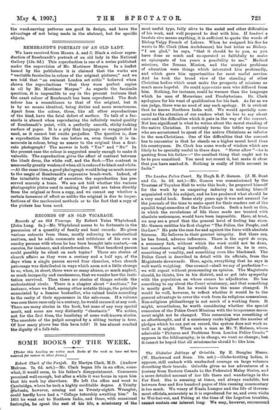The London Police Court. By Hugh R. P. Gamon. (J.
M. Dent and Co. 3s. 6d. net.)—Mr. Gamon was commissioned by the Trustees of Toynbee Hall to write this book; he prepared himself for the work by an unsparing industry in making himself acquainted with his subject, and he has produced what should be a very useful book. Some sixty years ago it was not unusual for the journals of the time to make sport for their readers out of the squalid tragi-comedies of the Police Courts. Such a book as this, in which the revelations of life thore made are treated with absolute seriousness, would have been impossible. Hare, at least, we may see a proof that the general level of feeling has risen. Mr. Gamon entitles his first chapter "The Police, the People, and the Law." He puts the case for and against the force with absolute fairness. He believes in their general integrity. But there are, he has found, adverse influences. There is the esprit de corps, a necessary fact, without which the work could not be done, but sometimes acting harmfully. And there is, he is sure, something of venality, and something even like blackmail. The Police Court is described in detail with its officials, from the Magistrate downwards. Here, again, everything that he says is well worth weighing. One counsel—shall we say of perfection ?- we will repeat without pronouncing an opinion. The Magistrate should, he thinks, live in his district, and so get into sympathy with the population on whose causes ho adjudicates. He has something to say about the Court missionary, and that something is mostly good. But he would have the name changed. It would be well, however, to reflect whether it would be to the general advantage to sever the work from its religious connexions. Non-religious philanthropy is not much of a working force. It might, nevertheless, be worth considering whether the special connexion of the Police Court Missions with the temperance move. ment might not be changed. This connexion was something of an afterthought, and if a missionary ranks highest the number of pledges which he can put on record, the system does not work as well as it might. When such a man as Mr. T. Holmes, whose admirable "Pictures and Problems from London Police Courts" appears in the bibliography, is in charge, wo want no change ; but it cannot be hoped that all missionaries should ba like him.














































 Previous page
Previous page